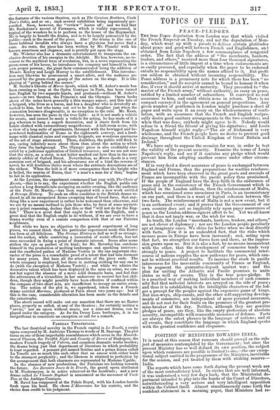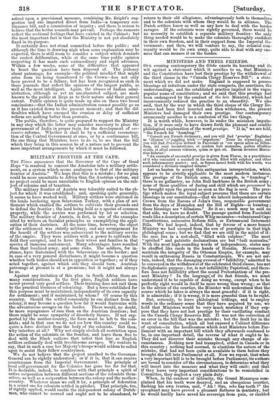POSITION OF MINISTERS TOWARDS INDIA.
IT is usual at this season that rumours should prevail on the sub- ject of measures contemplated by the Government ; but since the present Ministry has so well defined its own position, the subject upon which rumours are possible is limited to one,—the one excep- tional subject omitted in the programme of the Ministers, inevitable for the session, and yet treated by them with striking reserve— India. The reports which have come forth during the present week are of the most contradictory kind. In circles that are well informed, it was understood a very few days back, that the Ministerial de- partment intended to play into the hands of the Court of Directors, notwithstanding a very serious and very intelligent oppositiou within the Cabinet itself. Almost simultaneously came forth the confident statement in a morning paper, that Ministers had re-
solved upon a provisional measure, combining Mr. Bright's sug- gestion and one imported direct from India—a temporary con- tinuance bill, and a commission of inquiry ; and there is reason to believe that the better councils may prevail. Perhaps the rumours reflect the sectional feelings that have existed in the Cabinet; but the most important fact is that the Ministry is not yet absolutely fixed in its purpose. It certainly does not stand committed before the public ; and although the time is drawing nigh when some explanation may be expected, there is still room to consider a subject which demands the coolest deliberation, while at the same time public opinion respecting it has made such extraordinary and rapid advances. Within a few weeks, some of the difficulties that appeared to beset the question have been disposed of. The jealousy about patronage, for example—the political mischief that might arise from its being transferred to the Crown—has not only been proved to be a fallacy, but has been recognized as such in those journals that reflect the opinions of the largest public, as well as the most intelligent. Again, the abuses of Indian admi- nistration, although as yet an unexhausted subject, are made known to the public at large as to their nature and their general extent. Public opinion is quite made up also on these two broad conclusions—that the Indian administration cannot possibly go on as it has existed down to the present moment; and that the dif- ficulties which have excused the evasion or delay of sufficient reform are nothing better than pretexts.
The public, therefore, is quite prepared to support the Ministry in any step which the latter may consider necessary to place the government of India in proper train for the development of suc- cessive reforms. Whether it shall be by a sufficient reconstruc- tion of the Central Government at once, or by a continuance bill, the one thing that Ministers have to do is to see that the bill which they bring in this session be of a nature not to prevent the more important arrangements by which it must be followed.



























 Previous page
Previous page